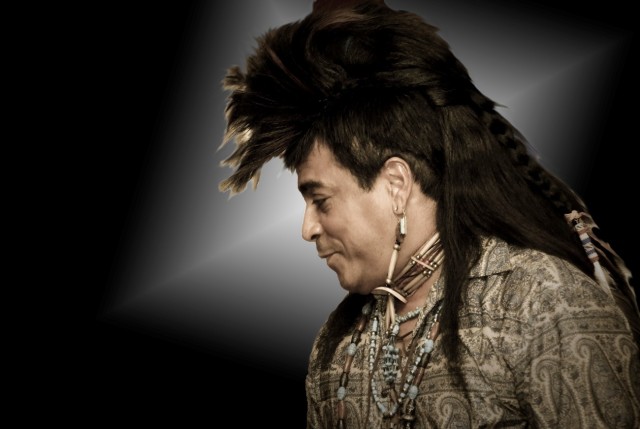
FORT MONMOUTH, N.J. -- His war whoops pierced the air, bounced off the walls and echoed through Gibbs Hall here. Felipe Rose, also known as Swift Arrow, has been called a "shadow walker," an American Indian term for a person who walks in two worlds.
Rose was the guest speaker and trainer for the Fort Monmouth Hispanic and American Indian Heritage cultural awareness training. The program was sponsored by the Garrison Office of Equal Employment Opportunity and the Hispanic Heritage and American Indian Committees.
His mother was born in Puerto Rico, came to the mainland United States when she was seven and later became a dancer at the Copa Cabana Club in New York City.
His father was a member of the Lakota Sioux tribe who was trained as a welder and relocated to the New York area to work at building skyscrapers.
Rose joked that his mother would say she was walking down a city street on the way to an audition when she looked up and saw this "gorgeous man" descending from above, holding on to a steel beam.
After they married they lived in Brooklyn where Rose said both parents had a strong sense of their culture and passed it on.
"I grew up learning to speak Spanish and to cook Spanish foods," he said "My rice and beans are the best."
He learned the Lakota Sioux culture from his Dad who would hand down the stories he had learned on the reservation.
At 16 he earned a dance scholarship and was on his way toward being a professional dancer. While performing in New York, he was approached by a French producer and they began to put together the foundation for The Village People, a disco group with such hits as "San Francisco/Hollywood," "Macho Man," "In the Navy" and more.
The Village People continue to tour and recently returned from playing at a festival in Brazil to an audience of 25,000. The band has been together for 33 years.
Rose said the group was in the airport in Brazil when they saw on a television monitor an account of the shootings at Fort Hood, Texas.
"I was trying to read the captions and my band mates were saying, 'Where is Fort Hood, what happened'' I was appalled by the attack on innocent people. It makes you think the world is sometimes moving too fast for something to go so wrong," he said.
He introduced his long time producer Forest "Frosty" Lawson, who sang a patriotic song he wrote about 9/11 called "America, the Light of the World."
Lawson said he donated the money raised from sales of the song to military charities. He spoke with pride about his experiences as a Civil War re-enactor and his pride in our nation.
"Our greatest natural resource is each other," he said. Rose spoke about his growing desire to return to his roots and the founding of "The Tomahawk Group" a state-of-the-art recording facility where he began to experiment with Native American music. His recordings, "Trail of Tears," "Red Hawk Woman" and "We're Still Here" all won Native American Music Awards.
Rose was further honored by the Smithsonian American Indian Museum for his contributions. Rose presented the museum with a gold record of the hit song "YMCA" and one of his headdresses. The group was also honored with a star on the Hollywood Walk of Fame.
"Music pulls us all together. Understand your culture and make the effort to understand others," he said. He urged everyone to go to his website and learn about "One Nation Walking Together," a confederation of tribes, and to donate funds or coats to the organization which then provides coats to the elders on the Pine Ridge Reservation in South Dakota.
He spoke to the Hispanic Americans in the audience reminding them of the many accomplishments of their people.
"Sixty percent of the baseball players in our country are Hispanic," he roared.
The D4C dancers of Lakewood, N.J., provided cultural entertainment during the event. They performed a dance from Colombia, one from Guatemala and a modern Spanish dance number. Rose is grateful for his success and said the defining moments of his life were not planned."Don't let anyone stop you from where you are going," he said to the dancers.
Rose sang and danced some of his Native American numbers and stayed after the program to autograph photographs and chat with his fans.

Social Sharing